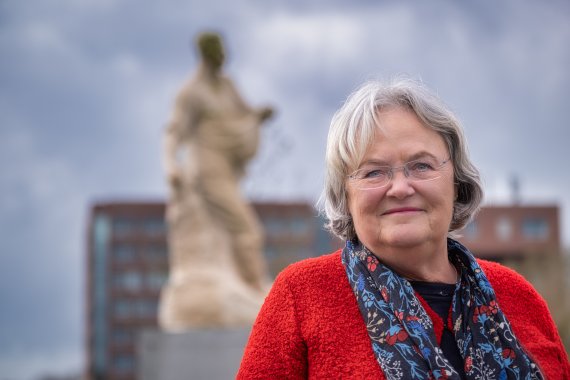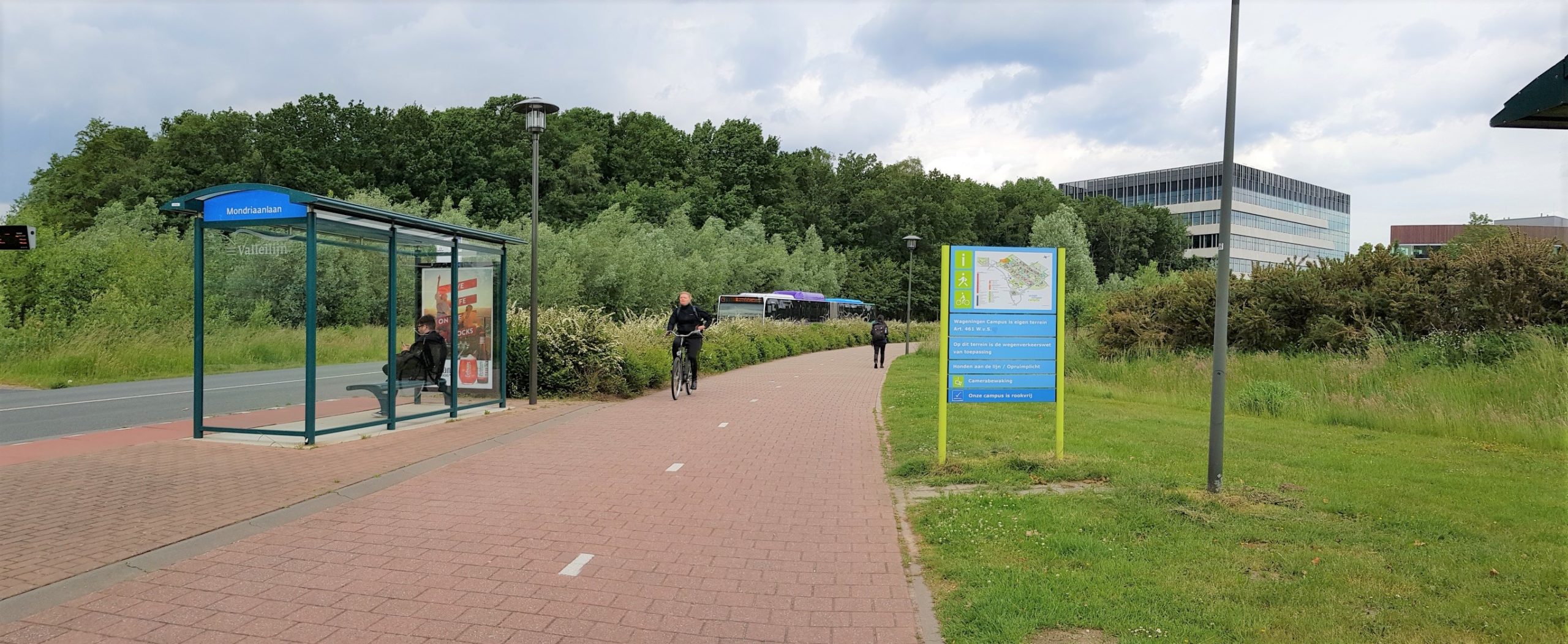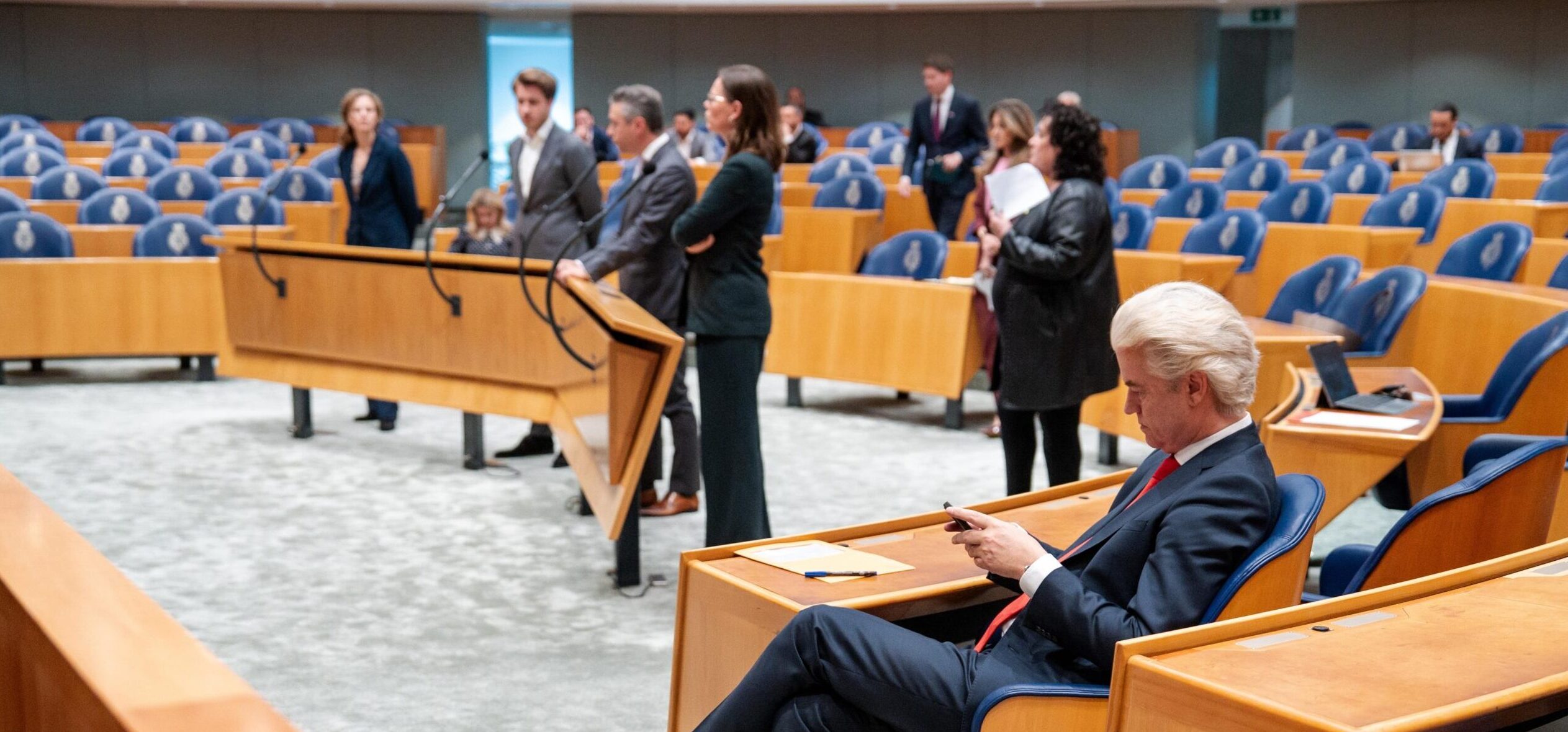She will still be around as a guest member of staff. WUR has no wish to say goodbye to its most successful blogger by far.
In the world of degree choice and student recruitment (not a good term, but more on that later), Hermien Miltenburg is a well-known figure. Her blogs on the website www.studiekeuzekind.nl are read by a lot of people. ‘With 80,000 visitors in the busiest months, it is WUR’s most visited blog by far. Last year I had half a million visitors. And this year, there will be 30 per cent more than that!’ She is a welcome guest in schools, where she supports school students and their parents in the difficult career choice ahead of them. She calls herself a ‘parent advisor’ and she is proud of being ‘the only one in the Netherlands’.
Do you know that I might be the Sower’s granddaughter?’ Hermien Miltenburg gets out a small replica of the iconic campus statue. ‘The story in our family is that my grandfather modelled for this statue. I was born in Swalmen, near Roermond. My grandfather was the biggest farmer in central Limburg. A lot of my uncles and cousins studied and worked in Wageningen.’ Miltenburg doesn’t know if the story about the Sower is true, but what does it matter? It’s too good a story to ruin it by fact-checking it.
Mother or nun?
In those days, Wageningen was an option for boys but not for girls. ‘Girls really weren’t important in central Limburg in the 1950s and 60s. I was the oldest of five children and I have two brothers and two sisters. Girls became wives and mothers. And I did really want to be a mother. Later, at infant school, I was also keen on being a teacher. Until I met a nun for the first time, in the first grade at primary school. Then I thought: I’d like that too. It took a while before I realized I couldn’t be all those things at once. So I dropped the idea of being a nun.
But Miltenburg did become a teacher. After going to a girls’ secondary school, she trained as a teacher in Nijmegen. ‘There I could combine two of my passions: Dutch and History. A double Bachelor’s degree, as you would call it now. That option for a double degree was an experiment that was abandoned later. But it suited me very well.’
So you were allowed to go to college?
My mother thought it was important for me to study and get a degree. And I was a fast learner. She herself had gone to secondary school and gained a diploma in book-keeping. When she was young, that was quite unusual for a girl. My father wanted me to come and work in his office. We had an insurance business at home, and my father had TB, which was a serious disease at that time. He was not very happy about me going off the college, but I still did it. Of course I had to raise the money myself. My parents had saved, but that was for my brothers’ education.’
How did you manage that?
‘By cleaning. Being the oldest girl, I was good at cleaning. Going to college was one big leap in the dark, actually. When I took lodgings in Nijmegen, I had just enough money to get through the first couple of weeks. Looking back, I don’t know where I got the courage from as an 18-year-old. I was bothered by the feeling of abandoning my family in this situation. But I went home at weekends and could help then. Until I got a boyfriend. Then I knew for sure that the old dream of becoming a nun was not for me at all.’
She laughs loudly at this. Miltenburg married that boyfriend, Eric. They lived together for 31 years and had three children. And things worked out, moneywise. She got a grant and taught the children of immigrant works from Spain and Italy who worked at the Dobbelman factory. ‘I heard on the grapevine that the soap factory was looking for people to teach needlework to the children of immigrant workers. I thought: that’s up my street. But I wasn’t very good at needlework.
There is a thin line between supporting and steering
There I was with a class full of children, while their mothers sat outside chatting in their own languages as they knitted, crocheted and embroidered. So I made a deal with them: you teach my needlework class and I’ll teach you Dutch.’
Not a Dr
Those language lessons for foreigners eventually led to her joining WUR. When the family moved to Renkum, Miltenburg started teaching in adult education centre with the Volksuniversiteit in Ede. Minnie Kop, coordinator of the Wageningen Language Centre at the time, hired Miltenburg in 1985 to teach a group of Indonesian students. Miltenburg rose up the ranks to be a team leader in the centre, helped several international partner universities to set up language courses, and made a start on a PhD based on the educational expertise she had acquired. ‘That was not a success. I discovered I was more of a hands-on type. I wasn’t cut out to become Dr Miltenburg.’
So then you became a parent advisor?
At some point I wanted a change. There was a vacancy for an editor in the publicity department. That was in 2003. Student numbers were falling at our university and I saw lots of room for improvement in the recruitment process. So I applied, but I was rejected because I was too old! Then I said: but I sit at my kitchen table with the target group. My children are at the stage of choosing a degree programme. That gives me a different perspective on the choice of degree than a fresh graduate in communication. In the end I was appointed after all.
Young people are a lot less independent these days. Parents solve a lot of problems for their children
Initially to write text for the website, brochures and that sort of thing. But I couldn’t shake off the idea of advising parents. And then my husband died in 2005, and I discovered that as a parent in such a vulnerable phase, you are very alone in the world. I missed having a sparring partner who could help me with the children’s choice of degree programme. What is more, I realized I was not the only parent struggling with this.’
Miltenburg lobbied the Executive Board and got the go-ahead to set up shop as a parent advisor. ‘I though we as a university should do something about this. Advice about the choice of degree is the responsibility of universities. I knew a bit about providing information and advice, and I knew a bit about being a parent, so I thought: let me do it.’ Her ‘shop’ grew into a much appreciated source of advice and information for school and higher education students and their parents. In recent decades, parents have played a bigger role in their children’s choice of degree programme.
Aren’t children of that age old enough to make a good choice themselves?
‘When I became a student myself I started out with the attitude: let’s hope it’s the right thing. You could do that then, but you can’t now. A lot depends on your choice, financially. And young people need a sounding board to help them with it. On top of that, young people are a lot less independent than they used to be. Parents solve a lot of problems for their children, or protect them from them. Why do we do that? We want our children to be happy. Happier than we are ourselves. So we become over-anxious and we go too far. That goes for me too. Only when young people go off to college do they start fending for themselves. And the first serious life questions only come then, when they move away from home.’
How can a parent be a good sounding board?
‘Think about your role as a parent. Take on your role as a coach. Try to support your child in finding out who he is and what suits him. Give thoughtful feedback and above all, don’t tell them what they should do. Don’t decide for your child, don’t give specific advice and, most importantly, don’t push them in any particular direction. There is a thin line between supporting and steering. Make use of the wisdom of experience you have, because they are still kids, aren’t they, who have to decide at 16, 17 or 18 what they are going to study? Point them towards the quality of the education. Nine out of ten people choosing a degree programme don’t think about that. Notice the student-teacher ratio, the teaching method, and whether there is a lot of group work.
Yet 20 per cent of university students drop out, and as many as 30 per cent in applied science and vocational programmes. How come?
‘There has always been a high dropout rate. I think it is so high now because there is such an idiotically large number of programmes on offer. In that regard, Wageningen is doing very well: the number of programmes we offer hasn’t changed much over the years. In other universities you see a lot more trendy degree subjects.
I realized I wasn’t the only one who struggled with this
My vision on this is: start with a small selection from broad programmes and explore the discipline as you go along, and what you want yourself. Wageningen does that well. And the dropout rate is much lower here. If you pass the first year here, you nearly always end up getting your degree. We do a lot to prevent dropping out. I am convinced there are universities that have thought up programmes purely to attract students. You know, I am against student recruitment actually. Yes, I know my department’s called Recruitment and Information, but Student Information is enough. Why recruit? A student who doesn’t fit here will drop out anyway. That is sad for the student and parents personally, but it’s not good for the university either.’
Gap year fund as swansong
And for those who can’t decide, a gap year can be a solution. Miltenburg promotes a gap year for young people who don’t know what to choose. She recently established a small fund that supports young people in following a gap year programme. She also helps organize a gap year fair, where young people who want to take a year off can shop around. The list of stands for this year reads like a holiday fair. Miltenburg shudders at the sight of it. ‘Ridiculous, isn’t it? Sadly, that is the image it has: rich young white people who go travelling. The commercial big boys target them. Most of the stand holders link self-discovery with travel. But the image is not correct. Only 30 per cent of gap year kids choose to go travelling.
Student information is enough. Why recruit? A student who doesn’t fit here will drop out anyway
And they are not the target group for my fund. I’m talking about programmes focused on getting to know yourself. A number of applied science universities have programmes like that. I would like to see WUR offering a programme like that.’
There is a fair chance that Miltenburg will see that happen. Because she is not stopping after retirement – Tuesday 7 April was her last official workday. ‘To my great delight, I was asked whether I would like to carry on with a couple of plum jobs as a guest staff member. I’d love to! I feel really honoured. I would even have done it on a voluntary basis, but now I will be paid for it.’ So she will carry on with the blog and the parents’ evening at secondary schools and universities. Just like a modern Sower? She think about that for a moment. ‘WUR offered me everything I was looking for as a young teacher. I am grateful for the opportunity to do this. I try to share my experiences as a mother and a schoolteacher with anyone who will listen. I’m a schoolteacher at heart, and a farmer’s daughter. Yes, I think I am a Sower.’

 Photo: Guy Ackermans.
Photo: Guy Ackermans. 

